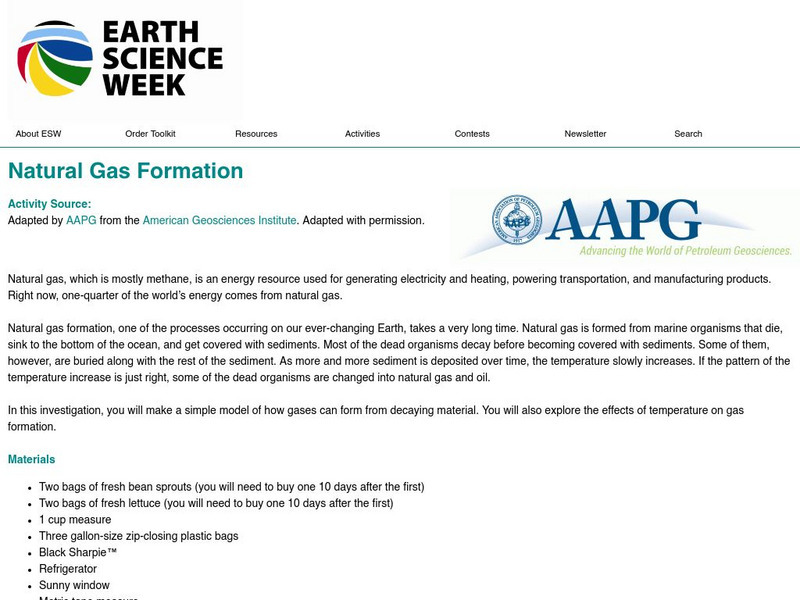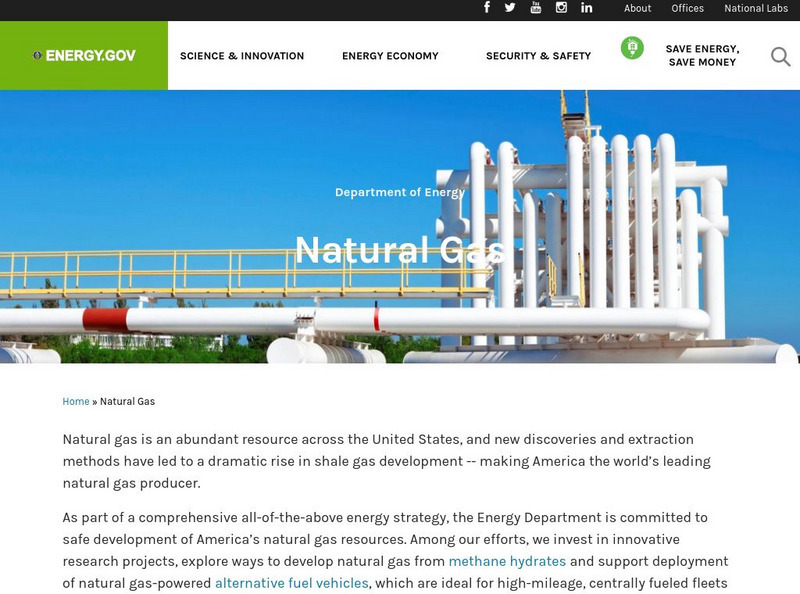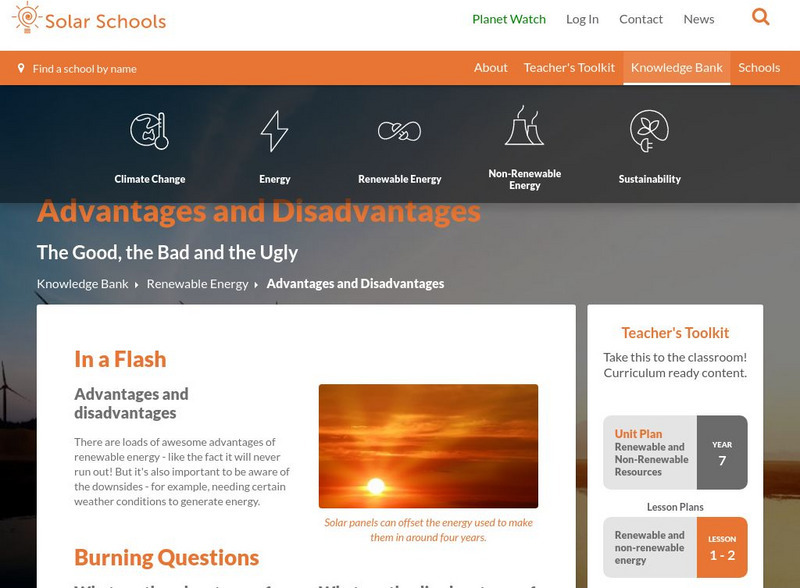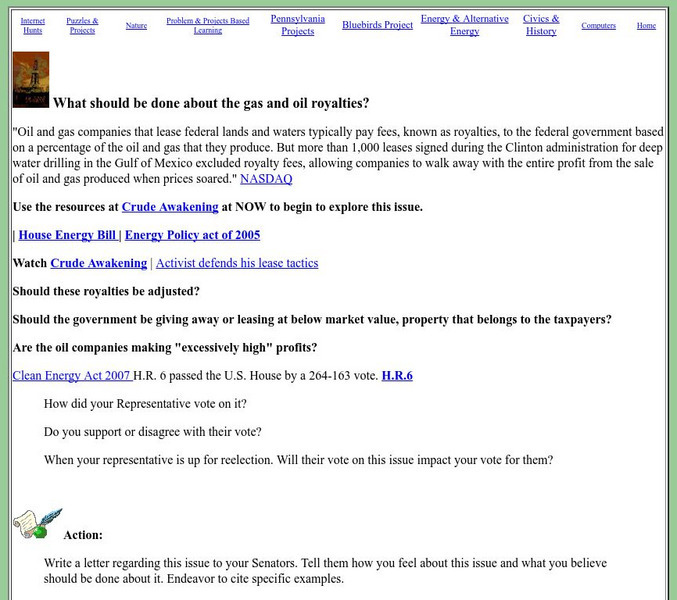Hi, what do you want to do?
Other
International Institute for Sustainable Development
The IISD--the International Institute for Sustainable Development--provides information on all aspects of sustainable development: business, climate change, economic policy, energy, and natural resources. Its website also includes...
PBS
Pbs Learning Media: Snapshot of u.s. Energy Use
This video segment adapted from NOVA/FRONTLINE looks at American energy consumption and the resulting production of greenhouse gases. [4:59]
National Academies of Sciences, Engineering, and Medicine
The National Academies: Our Energy Sources: Natural Gas
Energy production from natural gas is less destructive to the environment than energy produced from coal, but it is still produced from fossil fuels. While advances have been made in reducing its detrimental effects, our resources are...
American Geosciences Institute
American Geosciences Institute: Earth Science Week: Products Made From Petroleum
Small groups to research products made from petroleum other than fuels. The challenge is to find such products "hiding in plain sight."
TeachEngineering
Teach Engineering: Engineering for the Earth
Young students are introduced to the complex systems of the Earth through numerous lessons on its natural resources, processes, weather, climate and landforms. Key earth science topics include rocks, soils and minerals, water and natural...
American Geosciences Institute
American Geosciences Institute: Earth Science Week: Natural Gas Formation
In this investigation, young scholars make a simple model of how gasses can form from decaying material. They will also explore the effects of temperature on gas formation.
American Geosciences Institute
American Geosciences Institute: Earth Science Week: Products From Petroleum
Students explore and investigate with some common products made from petroleum.
US Department of Energy
Department of Energy: Natural Gas
Natural gas is an abundant resource across the United States, and new discoveries and extraction methods have led to a dramatic rise in shale gas development -- making America the world's leading natural gas producer. We invest in...
Alabama Learning Exchange
Alex: Conserve It to Preserve It
In this lesson plan from "The Friends of Auntie Litter", (http://www.auntielitter.org/), conservation and describing ways to sustain natural resources will be explored. Students will also recycle a paper plate to create a picture frame....
Other
Abc Da Energia
ABC Da Energia describes the many ways that energy can be obtained and conserved. It explains different sources of energy, how each works, and how energy can be saved in our daily lives. Interactive energy-saving activities and games...
Alabama Learning Exchange
Alex: Conserve It to Preserve It
In this lesson from "The Friends of Auntie Litter", (www.auntielitter.org), conservation and describing ways to sustain natural resources will be explored. This lesson is one from the "Take Pride Statewide" series. *This lesson is...
TeachEngineering
Teach Engineering: Rolling Blackouts & Environmental Impact
The goal is for the students to understand the environmental design considerations required when generating electricity. The electric power that we use every day at home and work is generated by a variety of power plants. Power plants...
Polk Brothers Foundation Center for Urban Education at DePaul University
De Paul University: Center for Urban Education: Natural Gas: An Energy Resource [Pdf]
"Natural Gas: An Energy Resource" is a one page, nonfiction, reading passage about how natural gas is located, drilled for, and sent through pipelines throughout the country to people's homes. It is followed by questions which require...
Polk Brothers Foundation Center for Urban Education at DePaul University
De Paul University: Center for Urban Education: Natural Gas: An Energy Resource [Pdf]
"Natural Gas: An Energy Resource" is a one page, nonfiction, reading passage about natural gas, its uses, and how it gets to homes. It is followed by constructed-response questions which require students to provide evidence from the...
Energy for Sustainable Development
Kids and Energy: Hydro Energy
Hydropower is a clean, renewable and reliable energy source which converts kinetic energy from falling water into electricity, without consuming more water than is produced by nature. Quite simply the oldest method by which renewable...
TeachEngineering
Teach Engineering: Biorecycling: Using Nature to Make Resources From Waste
By studying key processes in the carbon cycle, such as photosynthesis, composting, and anaerobic digestion, students learn how nature and engineers biorecycle carbon.
Other
Solar Schools: The Advantages and Disadvantages of Renewable Energy
One major advantage with the use of renewable energy is that as it is renewable it is therefore sustainable and so will never run out. Renewable energy facilities generally require less maintenance than traditional generators. Their fuel...
Cosmo Learning
Cosmo Learning: The Atmosphere, the Ocean, and Environmental Change
A collection of video lectures from a course that explores the physical processes the control Earth's atmosphere, ocean, and climate that is taught at Yale University. The course covers topics like clouds, rain, severe storms, regional...
Alabama Learning Exchange
Alex: Conserve It to Preserve It
In this lesson from "The Friends of Auntie Litter", (www.auntielitter.org), conservation and describing ways to sustain energy will be explored. Students will also create a web diagram of ways to conserve energy. This lesson is one from...
CK-12 Foundation
Ck 12: Earth Science: Coal Power Study Guide
This comprehensive study guide covers the main terms and concepts needed for an earth science unit on coal power. Review questions are included at the bottom of the study guide.
University of St. Andrews (UK)
University of St. Andrews: Albert Einstein
A truly complete biography of the great man. Some adequate discussion of his theoretical and scientific work, but the accent here is on his personal life. Many anecdotes, many quotes from him, many references and hotlinks to other...
Other
Open2.net: Ecosphere
Designed by the Open University and the BBC, this website from Open2.net explores ecosystems. Included is a lengthy discussion on closed ecosystems and their importance to research, as well as a virtual ecosystem, an interactive showcase...
Cynthia J. O'Hora
Mrs. O's House: What Should Be Done About Oil and Gas Royalties?
Engage the classroom in studying about oil and gas royalties paid to the government, in some cases not paid, with resources drawn from leased land paid for by the government. Take research results and contact state and federal government...























